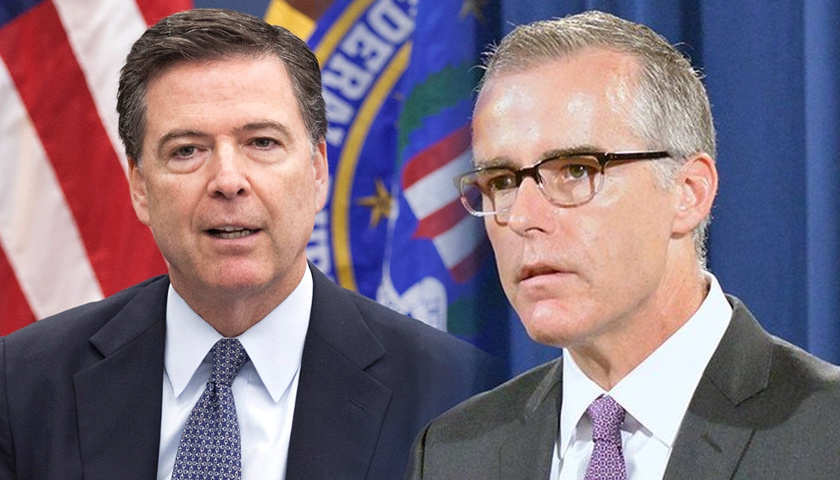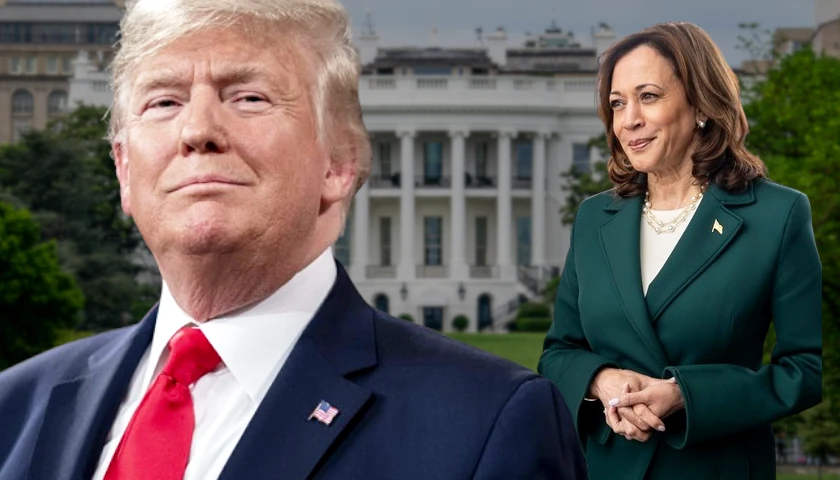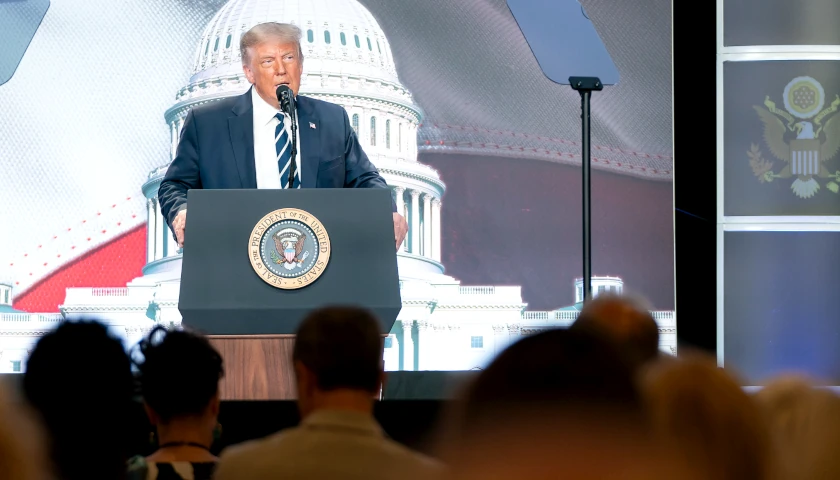by Julie Kelly
It is the controversial footnote to the most infamous application in American political history: The application submitted to the Foreign Intelligence Surveillance Court for approval to wiretap Trump campaign aide Carter Page.
And it could lead to the downfall of the Trump-Russia collusion schemers, as it will help make the case they misled the secret court to target an innocent man in an effort to thwart Donald Trump’s 2016 presidential campaign.
In an application filed with the FISA court in October 2016, former FBI Director James Comey accused Carter Page, a Trump campaign aide, of being a Russian agent. (The initial warrant also was signed by former deputy attorney general and Trump foe Sally Yates.) The document is symbolic of how the Obama Justice Department was weaponized against the Trump campaign by corrupt partisans, many of whom—thankfully—now find themselves under investigation.
The FISA application at issue claimed the Russian government, in coordination with Page, was attempting to “improperly and illegally influence the 2016 presidential election.”
The FISA court approved the FBI’s request, subsequently unleashing the most powerful government surveillance methods possible against Page: “It’s an order by the court to basically monitor that person 24/7, not just tap their phones but to plant microphones and cameras, whatever it takes, to capture their conversations,” explained Kevin Brock, a former FBI intelligence official, in an interview this week.
In other words, the FBI, at the behest of Comey, spied on Carter Page for one year.
But far from being a legitimate legal petition, the FISA application is an astonishing piece of political propaganda wielded for the most nefarious purposes. A February 2018 memo by Representative Devin Nunes (R-Calif.), the former chairman of the House Intelligence Committee, revealed how Comey and company cited uncorroborated allegations in the dossier compiled by political operative Christopher Steele as evidence that Page was a traitor and working with the Kremlin to disrupt the election.
Steele had been hired in the spring of 2016 by Glenn Simpson, the founder of the political consulting firm Fusion GPS, to dig up Russia-related dirt on Trump. At the time, Simpson was working for the Democratic National Committee and the Hillary Clinton campaign to smear Trump; Steele reportedly was paid $160,000 for his work. All of the payments were funneled through a politically connected law firm to skirt campaign disclosure rules.
But these pertinent details were intentionally omitted. “Neither the initial application in October 2016, nor any of the renewals, disclose or reference the role of the DNC, Clinton campaign, or any party/campaign in funding Steele’s efforts, even though the political origins of the Steele dossier were then known to senior DOJ and FBI officials,” Nunes wrote.
The probe’s defenders point to a footnote (some of which remains redacted) as proof they did inform the court of Steele’s partisan benefactors. Most of the footnote attempts to present Steele, named as “Source #1,” as credible, citing his past work as an FBI asset and stated the agency was “unaware of any derogatory information pertaining” to Steele. He’s described as “an FBI confidential human source” who gave details (now known to be wrong) to the agency about Page.
That mention is tagged with the infamous footnote: “Source #1, who now owns a foreign business/intelligence firm, was approached by an identified U.S. person, who indicated to Source #1 that a U.S.-based law firm had hired the identified U.S. person [Glenn Simpson] to conduct research regarding Candidate #1’s [Donald Trump] ties to Russia (the identified U.S. person and Source #1 have a long-standing business relationship.),” the footnote read. “The identified U.S. person hired Source #1 to conduct this research. The identified U.S. person never advised Source #1 as to the motivation behind the research into Candidate #1’s ties to Russia. The FBI speculates that the identified U.S. person was likely looking for information that could be used to discredit Candidate #1’s campaign.”
Now, that kind of obfuscation required some careful work. The Justice Department was well aware that Simpson was working on behalf of the Democrats; he had hired the wife of a top Justice Department official in late 2015 to collaborate with Steele on Trump-Russia opposition research. There is no mention of a “Candidate #2,” which would have been Hillary Clinton, or the rival political party, which would have been the Democratic Party.
The application’s authors engaged in literary gymnastics to avoid disclosing to the court the partisan nature of Steele’s work and Simpson’s Democratic patrons. It’s unlikely (let’s hope) that a secret court would approve the use of powerful spying techniques against an American citizen if the court was aware the evidence had been collected by a paid emissary working for that citizen’s political rivals.
Comey not only hid that highly relevant fact from the FISA court but also refrained from telling Donald Trump about it, too. In an interview last year with ABC News’ George Stephanopoulos, Comey admitted he didn’t notify Trump during a January 2017 briefing on the scandalous (and unproven) “pee tape” that the dossier had been produced by an operative working for Clinton and the Democrats.
“It wasn’t necessary for my goal, which was to alert him that we had this information,” Comey told Stephanopoulos.
James Baker, the former FBI general counsel who approved (but did not sign) the Page FISA applications, sounds a little worried about what outside investigators will conclude about the footnote. As he spins his role in the scandal—including this weird blog post about trying to love Trump—Baker insists the FBI did everything required in its disclosures about Steele.
“No one is going to miss a page-long footnote,” he scoffed in a May 10 interview with Comey BFF Ben Wittes. “These are federal judges, for goodness sake. They know how to evaluate wiretap applications…these are serious, serious judges. The information set forth in that gigantic footnote was consistent with the . . . way we would phrase things to basically be the red light [spinning hand motion] on top of the document.”
Baker also conceded he expects Justice Department Inspector General Michael Horowitz, who is investigating potential abuse of the FISA court, to conclude that “mistakes were made” by his department before the presidential election.
There are other serious doubts about the veracity of the application, including the repeated use of material from the dossier; the citation of news articles in which Steele was an anonymous and unauthorized source; and the omission of exculpatory evidence that could have alerted the court that Page should not have been a target.
But the footnote could pose the biggest legal threat to those involved: Former Acting FBI Director Andrew McCabe and Former Deputy Attorney General Rod Rosenstein also signed renewals.
Failing to notify federal judges about the conflicting role of a source that the FBI used to authorize intrusive spying methods against a private U.S. citizen just because he volunteered to work for the wrong (in their view) presidential campaign runs afoul of many laws, to say nothing of violating Carter Page’s constitutional rights. For now, it doesn’t appear as though their malfeasance will be relegated to merely a footnote of this historical scandal.
– – –
Julie Kelly is a political commentator and senior contributor to American Greatness. Her past work can be found at The Federalist and National Review. She also has been featured in the Wall Street Journal, The Hill, Chicago Tribune, Forbes, and Genetic Literacy Project. After college graduation, she served as a policy and communications consultant for several Republican candidates and elected officials in suburban Chicago.




